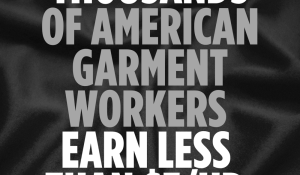
For the past several years, scientists had established the threshold of danger as two degrees Celcius, or about 3.6 degrees Fahrenheit. World temperatures could rise 2℃ above pre-industrial levels, they said, and after that point, coastal flooding, extreme weather patterns, widespread droughts and heat waves, and other climate-crisis impacts would become severe.
Island nations around the world begged to differ. Two degrees, they said, was suicide for them.
Because many lie only a few feet above sea level, they are already experiencing the most negative impacts of the climate crisis, and they will be the first to go underwater and lose their homes as sea levels rise higher. In 2003, in fact, Papua New Guinea’s Carteret islanders became the world’s first climate-change refugees as they began evacuating their islands when encroaching saltwater began to make them uninhabitable.
Prominent among those sounding the call for immediate, critical action on climate is Mohamed Nasheed, a political dissident who became the first democratically elected president of the Maldives in 2008. The Maldives is a country made up of 2,000 islands and atolls in the middle of the Indian Ocean. Like many small island nations, such as Papua New Guinea, Kiribati, or Tuvalu, rising ocean waters have washed away hundreds of feet of coastline, contaminated soil and drinking water, destroyed fisheries, and eaten away at sea walls that are supposed to protect the islands from flooding.
[I]t’s not something in the future. It’s something we are facing right now.
Mohamed Nasheed
With the United Nations International Panel on Climate Change (IPCC) predicting that the oceans will rise between .85 to 2.5 feet by 2100 if the world continues business as usual when it comes to the climate, experts say that 77 percent of the Maldives will be underwater by 2100. (Incidentally, that’s enough to swamp several east coast cities in the US as well.)
“The Maldives is just 1.5 meters above sea level,” he said in the 2011 documentary film The Island President. “And, because of climate change and sea-level rise, a number of islands are eroding. And it’s not something in the future. It’s something we are facing right now.”
Even once he was ousted from office in a 2012 coup led by a political ally of former Maldives dictator Maumoon Abdul Gayoom, Nasheed continued to tell the world that climate change posed an imminent threat to the islands’ 400,000 residents and others from island nations.
Nasheed is currently serving a 13-year prison sentence on what his lawyer Jared Genser says are “trumped-up charges”. As his legal team and activists around the world work for his release, he still soldiers on—both for the health of democracy in his country and for the health of the planet.
Mohamed Nasheed, The Climate Hero of Copenhagen
Nasheed rose to worldwide fame after the 2009 United Nations Climate Conference in Copenhagen, where attendees were attempting to hammer out an international agreement to take action on the climate crisis. Throughout the 11-day conference, media reports had leaked that the talks were in disarray, and no one expected any sort of climate agreement to result from the talks.
With a warm smile and a talented politician’s natural gift for crafting powerful soundbites, Nasheed worked the halls of the conference, as well as the international media, pressing for some kind of action, particularly from power players China, the US, Brazil, and India.
“Ultimately, we’re talking about New York. Manhattan is as low as [Maldives capital city] Malé,” he savvily told US reporters during the conference.
Well aware that he had to make his time in the international spotlight count, he took the stage at the People’s Climate Summit with a barn-stormer of a speech that succeeded in captivating reporters and activists alike.
“There are those who tell us that solving climate change is impossible,” he told attendees at the Summit, an “alternative climate conference” taking place in Copenhagen concurrently with the UN talks. “There are those who tell us taking radical action is too difficult. There are those who tell us to give up hope. Well, I am here to tell you that we refuse to give up hope. We refuse to be quiet. We refuse to believe that a better world isn’t possible.”
A Planet-Saving Step Forward
Nasheed’s goal going into the Copenhagen talks had been for a legally binding agreement that would require countries to take action to limit carbon to 350 parts per million and world temperature rise to 1.5℃. What he got was a voluntary agreement in which countries recognized the need to keep temperatures below 2℃ and pledged several billion US dollars to help developing countries adapt.
But even that was considered a miracle considering the gridlock the talks had become—a gridlock that Nasheed is widely credited with loosening.
“I understand this is not a legally binding document, but it has features that can migrate to become a very good, planet-saving document,” Nasheed told The Island President filmmakers at the time.
Fast-forward to the 2015 UN climate conference in Paris, and Nasheed’s small victory in Copenhagen laid the groundwork for a major step forward in France. In December, 195 attending countries agreed to adopt the Paris Accord, pledging to hold the increase in global temperature “well below” 2℃ and to “pursue efforts” to limit it to 1.5℃. The agreement will enter into force if 55 countries ratify it.
Though global leaders lacked the political and moral will to include legally binding protections for human rights, particularly Indigenous rights, the Paris Accord is widely considered a positive gain for climate activists.
“This didn’t save the planet,” Bill McKibben, co-founder of 350.org, said of the agreement. “But it may have saved the chance of saving the planet.”
Sadly, Nasheed was not in Paris to enjoy the fruits of his labor. He was arrested in February 2015 and sentenced to 13 years in prison by the current Maldives government.
A Leader Falls … and Returns
The United Nations Working Group on Arbitrary Detention reviewed the current case against Nasheed, who was convicted for allegedly ordering the illegal arrest of a senior judge when he was in office. The working group concluded last October that there was no legal basis for his conviction, and that he’d been targeted for political reasons.
Allies of former dictator Gayoom initially levied the charge against Nasheed in 2012 while he was still president, which spurred them to launch the coup against him. Once they succeeded in unseating him, they initially didn’t detain Nasheed. Things changed in 2013, when he ran for president once more.
Nasheed won that election, at which point “the Supreme Court inexplicably and unfairly annulled the results,” says Nasheed’s lawyer Jared Genser. “They rescheduled the election two more times in a two-week period to confuse the hell out of voters.”
Gayoom’s half-brother Abdulla Yameen won that second election. Well aware of the political threat Nasheed posed, Yameen’s administration upgraded the dormant illegal arrest charge to a terrorism charge.
“From there, the trial was egregious and outrageous,” says Genser. “[Nasheed] wasn’t allowed to call a single witness in his defense.”

Former Maldives president Mohamed Nasheed (pictured second right) at a press conference in London upon his release from prison for medical leave in January. Also pictured, left to right: Human rights lawyers Jared Genser, Amal Clooney, and Ben Emmerson. Photo by Associated Press/Alistair Grant
As the Green American went to press, international pressure had resulted in Nasheed being granted a temporary 30-day release from prison to get treatment for a back injury in the UK. The question now, Nasheed told reporters at a London press conference shortly after his release, is when and how he will return to the Maldives.
Nasheed and his lawyers are currently calling on political leaders worldwide, including President Obama, to impose “targeted financial sanctions and travel bans on senior [Maldivian] officials and financiers who are implicated in undermining democracy and committing gross human rights abuses,” Genser says.
The sanctions would put pressure on the Maldivian government to free the 1,700 people currently facing charges for peaceful political activity and speech, as well as Nasheed. (See the Resources Page to take supportive action.)
Even though Nasheed couldn’t attend the Paris talks, Genser says, “He’s just thrilled, completely thrilled with where it’s gone. He’s concerned these are voluntary and not binding commitments, but this is a dramatic step forward.”
[W]e refuse to give up hope. We refuse to be quiet. We refuse to believe that a better world isn’t possible.
Mohamed Nasheed
Sadly, the Maldives are no longer leading the world in taking meaningful action on climate change. Where Nasheed had pledged that the Maldives would be carbon-neutral within ten years of his taking office, the current administration is moving toward increasing climate emissions in the Maldives by 300 percent.
In addition, says Genser, they’ve entered into a deal with Shell to start exploring offshore oil drilling in the Maldives, and they’ve removed a number of environmental protections Nasheed’s administration put in place.
But even though he’s fighting to secure his freedom and bring democracy back to his embattled country, Nasheed’s example shines on for the rest of the world.
“Although he wouldn’t say it, I’ll say it,” says Genser. “If he hadn’t pulled off the minor miracle in Copenhagen that he did, they wouldn’t have had the basis to achieve what was achieved in Paris.”







